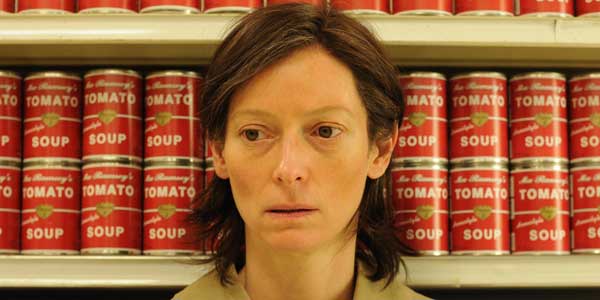
Director: Lynne Ramsay
Running Time: 112 mins
Certificate: 15
Release Date: February 27th, 2012

Lynne Ramsay became a true darling of the British indie film scene with Ratcatcher and Morvern Callar. While I found things to admire in both those movies, I remained undecided about Ramsay as a filmmaker, as I personally found that overall both movie felt lacking. However, I do think her third film, We Need To Talk About Kevin, based on the bestselling book by Lionel Shriver, is very good, although perhaps not for exactly the same reasons Ramsay and the actors do.
We Need To Talk About Kevin is a movie that’s possible to take two completely different ways. It could be a mother trying to deal with a son who was simply born evil, or alternately it could be about a son who ends up bad because his mother never felt the bond parents are supposed to, or perhaps somewhere in between. In the cast and crew interviews that make up the special features, the actors suggest they believe it’s more about the mother not feeling the expected bond with her son and the incredibly smart Kevin reacting to it, but when I watched it, I saw the exact opposite.
It’s undoubtedly the most fascinating thing about the movie, that looking at reviews and other reactions, people have had two completely different views of what the film is about, and each side is absolutely adamant their view of it is right. So some react to what they perceive as the film saying some people are born evil, while others rally against the idea that parents are responsible for evil kids, and neither side seem to realise that actually the film is so ambiguous you can take it an entirely different way.
At the opening of the film we are aware that something terrible has happened, as Eva’s (Tilda Swinton) son Kevin (Ezra Miller) is in prison and the whole town treats her as a pariah, presumably because of what her kid did. She lives through the aftermath of whatever took place, looking back over her life, from the birth of Kevin right through to the days leading up to the evil deed that landed him in prison and left his mother’s life in tatters.
When I was watching the movie, I felt rather annoyed by what I perceived to be the film’s suggestion that perhaps people who do heinous things were simply born bad and they’d been that way from the moment they were born. It seemed to me that while Eva sometimes went way too far with Kevin, her issues with him were more a response to having a kid who seemed to hate her from the moment she popped out and who oozed ‘badness’. In the interviews on the disc, Ezra Miller says they deliberately didn’t want to create an evil child movie, a la The Omen, but my initial reaction was that We Need To Talk About Kevin was essentially a morally complex version of that. That’s not necessarily a bad thing, as while I’m not a big fan of the idea people are born evil, the film functions as a fascinating exploration of people trying to deal with a very difficult situation where a child is incredibly difficult. After all, if you did have an ‘evil’ kid, what would you do?
It was only when I started reading other people’s reaction that it struck me you could take the film completely the other way, where it’s Kevin’s reaction that’s the understandable one, as he’s dealing from birth with a situation where his mother’s maternal instinct doesn’t kick in and he knows she’s merely going through the motions with him. Both mother and son also have to deal with John C. Reilly’s Franklin, a father who’s ‘everything’s ok’ breezy attitude masks being so far in denial that he is perhaps the most culpable of them all.
Normally a film this ambiguous would suffer for it, but We Need To Talk About Kevin succeeds admirably. The reason is perhaps down to something John C. Reilly mentions in his interview on the disc, which is that what we’re seeing in the film isn’t what really happened, but Eva’s remembrance of it. What we watch is therefore deliberately an interpretation of the truth, and so it becomes a film full of fascinating ambiguity. Eva’s recollection is a mix of blaming Kevin and seeing every bad thing he ever did as evidence of how evil he is, and blaming herself and feeling she caused Kevin to become evil (and many in her town want to blame her too). It is a film about a woman looking back and asking why, but as in life, there are no easy answers, and the fact you can view the film as saying two totally different thing, depending on your own preconceptions, is immensely intriguing.
Many have said it’s a disgrace Tilda Swinton wasn’t nominated for an Oscar for her excellent performance. There’s no doubt she missed out due to some truly great work in other movies by some excellent actresses, as in most years she would have for a nom. The entire movie hangs on her and she rises to the occasion magnificently. While Ezra Miller is perhaps a little too moustache-twirly at times as Kevin, Swinton keeps the whole thing very grounded and real.
As mentioned the disc includes cast and crew interviews, which are the only special features but certainly help to put the movie in context and act as an excellent accompaniment to a film that is bound to leave you with a lot to think about. The picture quality is good, but doesn’t offer the most amazing clarity ever on Blu-ray. It’s not an issue as it’s certainly a lot sharper than DVD and this isn’t the sort of film where bright colours and fast action demand perfect sharpness.
Overall Verdict: A fascinating film that it’s possible to take in many different ways. It explores some dark issues in an ambiguous, immensely thought-provoking way.
Reviewer: Tim Isaac





Leave a Reply (if comment does not appear immediately, it may have been held for moderation)